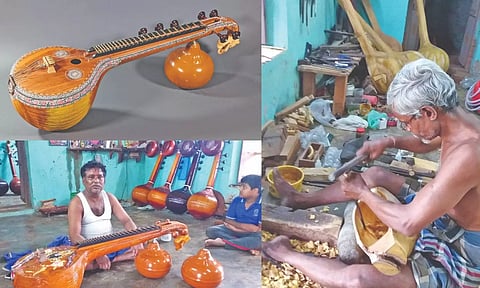

THANJAVUR: Carnatic music is incomplete without Veena, the celebrated Vedic instrument, and among them the Thanjavur Veena is considered godly. The makers of Veena once enjoyed royal patronage and high respect in the community but now have lost their livelihood due to less patronage.
This has resulted in many skilled persons, who were making the instrument, going in search of alternate employment. Thanjavur Veena is celebrated among classical musicians and is considered Saraswathi Veena for its godly appearance and Ragunatha Veena as the shape was finalised during King Ragunatha Nayakkar, who ruled Thanjavur in the early 17th century.
Though Veena is manufactured in several states of India, Thanjavur Veena has its excellence as the manufacturers had exceptional knowledge and thus this instrument got its GI tag in 2010.
Usually, the matured jackfruit tree bark is used for the Thanjavur Veena, and the total weight of the instrument ranges between 7 and 8 kg, which is considered the lowest weight ever for such an instrument. So these are the most sought-after instruments among the Carnatic musicians. Once Thanjavur used to have large clusters of jackfruit trees but in due course of time, the number of trees declined in the district and now, they buy wood from places like Panruti and Cuddalore.
Jackfruit wood is predominantly used for Veena crafting as it’s perfect for all weather and long-lasting.
“There are three main parts in a Veena — a peg box, a fingerboard, and a resonator. When all three portions are scooped out of the same log of wood, it is called ‘Ekanda’ Veena. But sometimes they are separately made and joined and they are called ‘Ottu’ Veena (joint Veena) and both are famous in Thanjavur,” says T Gunasekaran, one of the Veena manufacturers from South Street in Thanjavur. The craftsmen must possess immense knowledge of music and understand the nuances of sound and tonal quality. The resonator called ‘kudam’ is deep and carved like a vessel; the hollowed fingerboard is long and curved from the bottom and ends in the peg box.
Gunasekaran said that it was once a flourishing business to the artisans but the number of skilled workforces had declined due to poor patronage and now just 40-odd people are involved in making the traditional Veena. Since several parents prefer their children, especially girls to learn Veena, the demand for the instrument has increased recently. Earlier we sold 50 to 60 Veenas but now, it surpasses 100 a month.
“Apart from the other states, we get orders from the US, Canada, Singapore, and Malaysia, and the government should encourage and help us in exporting the instrument,” he said.